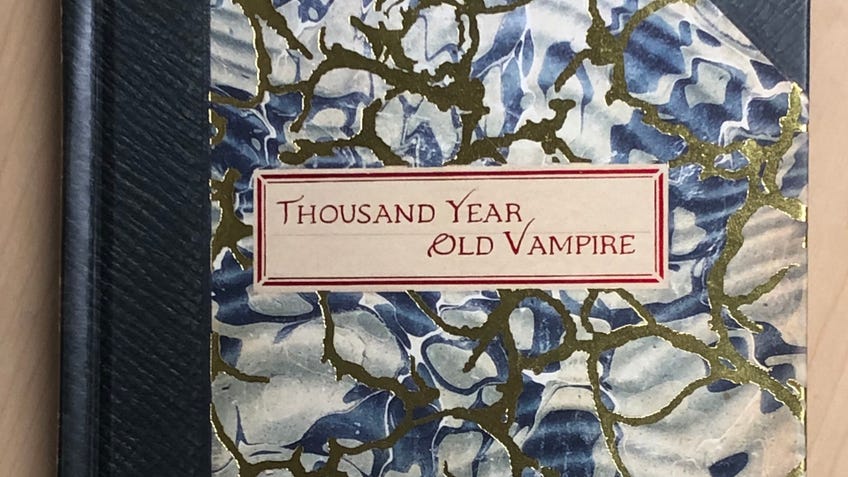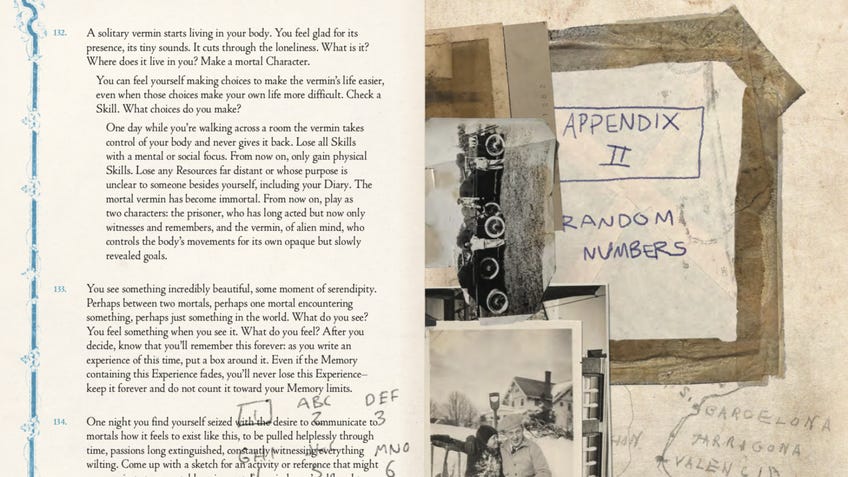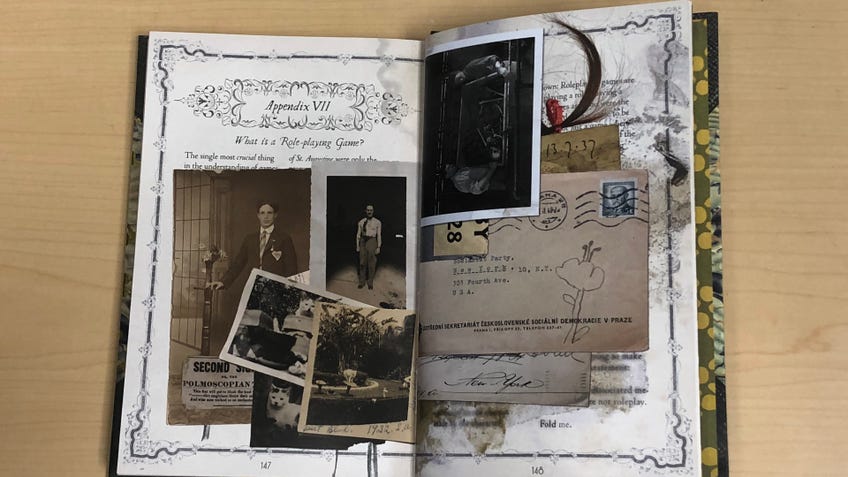New Thousand Year Old Vampire companion book have some players angrily grabbing stakes and garlic
Designer Tim Hutchings responds to the reaction to his unique addition.
A thread titled “Thousand Year Old Ripoff” in the r/Solo_Roleplaying subreddit recently caught my eye. The author was upset when they received the companion book for Tim Hutchings’ solo journaling game, Thousand Year Old Vampire, and found it wholly different from their initial expectations.
User alcaron was so upset, in fact, that they brought their complaints to the community, arguing that the $54 (£39) book - including shipping - left them upset, angry at the waste of paper and, well… ripped off. “I will say up front, the product page was not a lie...he is an idiot, and I am bitterly disappointed,” alcaron wrote, referring to Hutchings.
In the r/rpg subreddit, another user reported a similar experience. The post, now deleted, briefly explained what the companion book contained and asked if anyone else had the feeling Hutchings was running some kind of scam. “Or do you feel happy at being the butt end of his apparent joke?” the deleted user wrote. “I doubt that I'll see it, but I do want my money back, and this really makes me think twice about supporting any small game designers.”
Discussions in the same vein were happening on Twitter as the small batch of pre-order copies gradually arrived at doorsteps and mailboxes. Hutchings tracked the responses to the book on his account, keeping a running tally of the various reactions from posts, replies and emails sent his way. By the time he stopped counting, the number of pleased purchasers equaled the confused, the disappointed and the downright angry.
The purchase page for the $45 (£33) companion volume on Hutchings’ website initially describes it as either a secret or a surprise. The designer is cagey and apprehensive in his language when he lists its attributes in a bulleted list: It is a 188-page hardcover book in full colour, but it is not a game; it is neither a writing journal, a book of puzzles nor a functional expansion for the original game; and it does not contain musings, commentary or reflections.
Hutching characterizes it as useless, but worthwhile, admitting that any qualitative description of his creation simply will not apply to every person. He seems to go out of his way to dissuade anyone from paying for the physical-only book, instead entreating them to wait until the page is updated with full details and images.
So, what made the companion novel so polarizing? What had Hutchings created and released into the world that caused consternation, regret and at least one person to ostensibly swear off indie RPGs?

**Spoilers for the Thousand Year Old Vampire companion book below**
The book looks at first glance like a carbon copy of the original, except that any words or images have been scrubbed of details until nothing but empty boxes remain, vague outlines and suggestions of text and photos. The inside is the same, as evidenced by this thread of images compiled by one player. All 188 pages are glossy amalgamations of empty shapes and colour blotches, and even the spine is an illegible mess of white symbols.
Such an object probably sounds baffling without first understanding the intent of Thousand Year Old Vampire. The game positions players as a human who is swiftly turned undead by a fateful run-in with a creature of the night. They then spend the resulting millenia wandering the world, hiding from society - or covertly dominating a sphere of it - and all the while distancing themselves from their lost humanity. As the game progresses, memories fade into dust - names of parents and children, the place they were born, their mortal ambitions, etc.
Hutchings told Dicebreaker via email that both volumes are meant to sit together on a bookshelf, so that when one is grabbed the former player might accidentally pull the blanked out companion and experience a rush of confusion at the meaningless mess. He told those players who reached out to him much the same, and many seemed to have immediately resonated with this authorial intent.
“Not everybody is going to think this thing is a worthwhile project, have no doubts. I never thought that,” Hutchings said. “But, dang, it takes a special kind of person to look at all the warnings I put on this and get MAD the moment the book arrives. I wish I had that sort of self-confidence about things, I could rule the world.”
The designer was dismayed that he had to charge as much as he did - or at all - saying he wished he could just slip copies of the companion book into the hands of any interested player. But Hutchings found it difficult to empathize with those who felt cheated in light of what he felt were clear warnings on the purchase page, along with a final cautionary email days before pre-orders began shipping.
“I feel pretty confident that the book is exactly as advertised, too. There's no trickery here, this isn't some clever ruse,” Hutchings said. “If I wanted people's money I would just be cranking out "Module S3, Thousand Year Old Vampires In Space" nonsense. That's easy to do. This, this dumb thing I'm doing right now, this is hard.”
Some players expressed sadness that the companion book was in no way readable, while others assumed Hutchings had concocted some elaborate puzzle with a hidden cypher or clue that would unlock the apparent garble of graphic design. They scanned the volume under ultraviolet light, meticulously cross-referenced every facet with the original, and invested otherwise pointless labour in untangling the mental knot, which blindsided Hutchings.

Emails and reviews tended towards overwhelming positivity, even if tinged with initial frustration. A great example of this is a recent essay from indie designer Chris Bissette (The Wretched, Treasures of the Troll King) who spoke about their own fallible memory, initial anger giving way to awe and wrangling with art as both a consumable object and a frictional experience. It’s an encapsulation of many players’ discussions regarding Hutchings’ curious book and the exact emotional journey he had hoped for.
“They had disquiet and delight and feelings from the book that they wouldn't have gotten if I'd spelled the thing out in all it's detail ahead of time. They trusted me, then they trusted my work and had open hearts and put in effort. This book is theirs,” Hutchings said. “The folks who refused my warnings and got mad, they didn't trust me and then they didn't trust the book. What did they think would happen?



